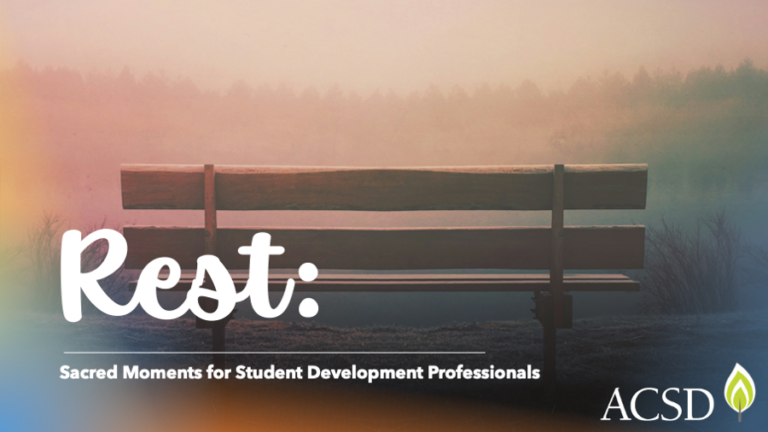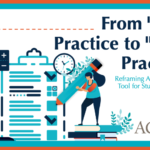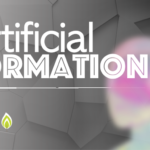![]() This content is brought to you by the Association for Christians in Student Development (ACSD), a volunteer membership organization committed to equipping and challenging faithful professionals to infuse their Christian faith into student development practice and scholarship. Thoughtful content such as this is made possible by volunteer contributions and the financial support of membership dues. Interested in becoming a member for more awesome content just like this? Join today by clicking here!
This content is brought to you by the Association for Christians in Student Development (ACSD), a volunteer membership organization committed to equipping and challenging faithful professionals to infuse their Christian faith into student development practice and scholarship. Thoughtful content such as this is made possible by volunteer contributions and the financial support of membership dues. Interested in becoming a member for more awesome content just like this? Join today by clicking here!
The work we do as Christians in student development, while challenging, is immensely impactful for the growth of the students we serve. The years that students live and learn at our institutions are formative and there is a certain joy that comes with helping students as they journey to achieve their goals. For many of us in student development positions, our efforts are aimed towards faithful student flourishing. We care both about what they learn and also who they are becoming as they reach the finish line of graduation. These visions for student thriving are worth pursuing, yet this work can be draining as well.
For many Christian student development professionals, the work can be viewed as a sacred calling that motivates our daily efforts and drives us even when the work is taxing in many ways (Glanzer, et al. 2020). Whether a student development professional has worked in the field for 10 years or 10 months, the immense social, physical, and emotional exhaustion that comes from working so closely with college students becomes readily apparent. Even for those of us who carry the hope of the Gospel into our everyday work, certain periods of “professional disenchantment” can creep in that not only discourage us personally but can also affect the students we feel called to serve (Schultz, 2022). It is important to acknowledge and speak truth to the challenges of student development work, but then it is even more important to also develop healthy, faithful ways to deal with stress and burnout.
Rest: Finding Sacred Moments
One helpful way that Christian student affairs professionals can engage in soul-care for personal and professional enlivenment is to engage in more regular experiences of rest. While we may not be able to take full sabbaticals like our faculty colleagues, creating a cultural emphasis on rest can help student development professionals to identify and reflect on “sacred moments.” These moments do not need to be profound, life-changing, “burning bush” moments (such as Moses had), but rather can be small and meaningful experiences which come incidentally or through intentional periods of rest. Perhaps it involves conversations with students or walks across your campus, or maybe you set aside one afternoon every week for prayer and devotion, or you try and block one weekend every month to encounter Sabbath rest time. Sacred moments such as these can be reminders of the “why” behind our work. They can reveal the significant ways God is moving in the lives of students on our campuses, and they can serve as refreshing periods that recalibrate our focus on Kingdom-priorities.
It goes without saying that rest can certainly feel hard to find for student development professionals. Many roles in our field involve on-call duties, late nights, weekends, responding to emergencies, and integrating as much as possible into the lived experiences of the student body. It is within this context that experiencing rest and sacred moments can be hard, wherein the duties of the job often supersede some areas of our personal schedules. Yet, finding balance within your own work, and also encouraging the entire institution to model healthy boundaries that allows others to pause is of critical importance for the spiritual well-being of the entire community (Glanzer, et al., 2020).
First and foremost, leaders in student development units should be exemplary models of allowing for moments of rest by incorporating such practices in their own work-life paradigm. Second, there should be more than just encouragement for team members to rest, but actual intentionality in cultivating cultural norms for rest. Without being too predetermined, where are the places and spaces within the work-life paradigm that allow for moments of separation, distance, and recalibration – all with the intention of allowing for soul-care for team members to return to their tasks rejuvenated? Ultimately, having such conversations amongst colleagues can help enculturate the shared value of rest into student development dynamics. In turn, this shows students how important such values are in their own educational and discipleship journeys. One helpful model for thinking about rest as sacred moments is to explore these concepts within the lives of student development professionals as daily, weekly, and monthly experiences.
Daily Rest
Finding rest in the daily experiences of serving our students is of vital importance to personal soul-care and persistence in the industry. Within even the most challenging and time-consuming days, finding even a few minutes to break away and rest is key. This could include:
- Identifying a “thin place” on your campus (Genesis 28:16). Celtic Christian tradition teaches that thin places are spaces where it seems the distance between heaven and earth are uniquely narrow. I’d argue that many of our campuses have such spaces, and they can be meaningful spots to experience sacred moments of rest, prayer, and reflection.
- Take a walk and appreciate campus life. Perhaps sacred moments can occur on a daily basis by disrupting routines and taking a few minutes to walk around campus. Observing and appreciating student life on campus can be a restful practice that interrupts the monotony of task-oriented patterns such as emails and reports. Stop and appreciate the student lives you see on your campus.
- Capture encouraging moments. One practice that has been particularly helpful to me is to save or jot down notes about encouraging experiences, emails, conversations, or other moments from each day. Saving these tokens of gratitude provides a catalog of sacred moments that can be a reprieve after particularly challenging moments in any day. Take time to pull out these tokens in moments of need.
Weekly Rest
In addition to daily rest, weekly rest is not only practically valuable but also divinely modeled for us through scripture. Sabbath rest is a way for us to participate in the work of God week in and week out (Genesis 2:2). In addition to the immensely important participation in local faith and church communities on a weekly basis, student development professionals can also ensure they experience intentional moments of rest on a weekly basis. Even for those with on-call duties, periods of weekly rest can be rejuvenating after the culmination of a week and before the onset of a new workweek. Finding sacred moments through rhythms of weekly rest can look vastly different for everyone, but a few ideas come to mind:
- Take a hike! For some, weekly rest may involve making time to read a good book over the weekend, going on a hike with friends, utilizing artistic giftings, or engaging in personal wellness and physical activity. These sacred moments need not be “Christian” experiences, but in both the sacred and secular we can be reminded of God’s presence in all things.
- Get off campus. Regardless of specific activities one may engage in for rest, it is also important to identify the balance of on-campus versus off-campus time. Student development professionals frequently spend a great deal of time on-campus, even during nights and weekends. Be sure to find time to get off-campus – for both sacred moments or simply just restful moments of disconnect and recalibration. Move away so that you can move back in.
- “Close out” the week. It can also be particularly helpful to take a moment at the end of each week (whatever that looks like for you) and mentally “close out” each week by writing, journaling, and reflecting on the last few days. Pray in these moments and allow God to renew your heart as a new week is about to begin.
Monthly Rest
Student development professionals likely will have a hard time finding the margin to “get away” for a period of time within any given semester. But how rejuvenating might it be to our souls and our motivations for us to be able to rest in a significant way at least once per month? This does not have to be a vacation or an expensive excursion. Rather, think of monthly rest as developing habits that model Jesus’ rhythms of retreat in scripture.
We see many times that Jesus intentionally separated himself from regular patterns of his life to engage in sacred moments with God the Father, all so that he could then reenter the world full and continue his work (Matt. 14:13; 14:23; 15:29; Mark 1:12; 1:35; 1:45; 3:13; 6:31-32; 6:46; 14:32; Luke 5:15-16; 6:12-13, among others). This type of approach gives student development professionals a model for monthly rest that can involve retreating from the job so as to reenter it spiritually fuller and more prepared. Some thoughts to consider include:
- Plan ahead. Pick a day and time or weekend (and be flexible as sometimes duties require adjustments) and be intentional about the activities or experiences you want to engage in.
- Plan who. Discern whether your times of rest need to be solo, or in community, with family or friends, mentors, or other key people.
- Plan what. Do fun and life-giving things. Enjoy these moments and make them memorable, breaking monotonous routines. Create dense memories that come from trying new things and pushing yourself outside of your comfort zone. Yet also ensure your rest is recuperation as you prepare for a new month ahead.
- Reflect on why. Reflect more in-depth on the themes and patterns that came from your previous month. Pray for the students you’ve encountered and the challenges you (and they) have overcome. Ultimately, recommit to your “why” and the calling you feel to be in student development (or seek discernment if you are feeling pulled towards other paths in your future).
I’d like to steal a moment here to offer one important encouragement as you think through rest personally or encourage other student development professionals: consider mental wellbeing. Perhaps the most sacred rhythm you or someone you know can implement right now is to engage in clinical therapy. Whatever that may look like for you or those around you, foster a culture of support around mental wellbeing as a facet of rest.
Final Thoughts
Dallas Willard is cited as having once told pastors, “I pray you will never hurry again,” which ultimately is an idea borne from observing the life Jesus lived (Glanzer, 2021, p. 154). Understanding that rest is a critical facet of our participation in God’s kingdom work, and also modeled for us in the ministry of Jesus. It demonstrates to us that slowing down to rest ought to be a regular rhythm in our personal and professional lives. However you decide to think through engaging in rest as a student development professional, I hope that small sacred moments will be made known to you and that you can acknowledge and appreciate them as life-giving reminders of God’s sustaining power through the Holy Spirit that works within us. May daily, weekly, and monthly moments of rest empower you to do the work set before you in service to our students, our institutions, and God’s Kingdom.
References
- Glanzer, P. L., Cockle, T. F., Jeong, E. G., & Graber, B. N. (2020). Christ-enlivened student affairs: A guide to Christian thinking and practice in the field (p. 27). ACU Press.
- Schultz, Q. (2022). Servant teaching: Practices for renewing Christian higher education (p. 37). Edenridge Press LLC.
- Glanzer, P. L., Cockle, T. F., Jeong, E. G., & Graber, B. N. (2020).
- Glanzer, P.L. (2021). Identity in action: Christian excellence in all of life (p. 154). ACU Press.







